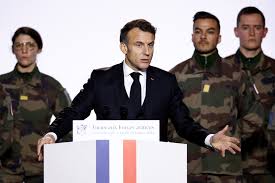By Anthony Bell
Mobilizing industry will take time, while the situation in the EU is far from a “war economy.” The problems are related to the fact that the union has not previously invested in the military-industrial complex (MIC), which also affects aid to Ukraine
The European MIC has already encountered difficulties in meeting Ukraine’s needs for weapons and the requests of member states.
Europe is now rushing to relearn how to mobilize industry on a military basis. But you can’t just flip a switch. Building production lines, hiring and training workers and other processes will take months, if not years.
Military production in the EU is currently far from what is called a “war economy,” and at the same time, the reality of the situation diverges from the statements of politicians.
Against this background, statements are being made according to which Europe should develop its own MIC in order to reduce dependence on the United States. Such a statement was made on January 21 by French Defense Minister Sebastien Lecornu.
The situation in Europe is “a crisis that has been brewing for many years.” The problem is related to the fact, he said, that European countries have previously been unwilling to invest in reserve lines of defense enterprises in order to increase production if necessary. This can be compared to a situation in which a country where snowfall is rare does not invest in snow removal equipment and faces problems when a snowstorm begins.
“European countries must decide: to allocate state funds to purchase weapons from the United States, aggravating dependence on Washington, or, finally, to achieve autonomy in the defense sphere,” he said on the air of France Inter radio.
The minister called the desire of European countries to purchase weapons from the United States a mistake.
In addition, Lecornu disagreed with the executive vice-president of the European Commission (EC) Stéphane Sejourné, who called on European countries to invest more in their defense in exchange for the United States’ agreement to “trade peace.” He said that this would not be considered.
Lecornu stressed that the EC does not focus on European weapons, while France is focusing on this aspect.
The day before, French Prime Minister François Bayrou said that the European Union (EU) would be “crushed” by the policies of US President Donald Trump if the Europeans do nothing. He called on Europeans to reunite to resolve the issue of the threat from the American side.
Before this, on January 15, former Austrian Foreign Minister Karin Kneissl said that Trump does not care about the EU, which is currently experiencing a crisis. She expressed confidence that the politician is wise enough to focus on the problems of the United States after coming to power.
At the same time, the French Ministry of the Armed Forces expresses serious concern about the development of the European Defense Industry Program (EDIP), initiated by the United States, which, according to Paris, does not meet French interests. In particular, the amendments to the program introduced in early November 2024 at the initiative of Poland and the Netherlands, according to French experts, open up opportunities for the United States, Great Britain and other NATO countries that are not members of the EU to use European funding, and also grant Europeans the right to use American-made parts, components and assemblies in weapons and military equipment without restrictions, the analogues of which are not yet available in the EU.
The amendment lobbied by the United States and introduced by Poland and the Netherlands on the use of American components for the production of weapons and military equipment in EU countries will result in France blocking foreign trade export transactions of Paris with foreign customers under the pretext of compliance with American legislation prohibiting the transfer of sensitive technologies (International Traffic in Arms Rules – ITAR).
The absence of a definition of “design authority” in this program creates a legitimate field for practical activities in the EU of joint production enterprises with the shareholding of competitors from the United States, Great Britain and structures affiliated with them. This significantly narrows the “export maneuver” of Paris, which hopes to use EDIP to finance its defense industry, attract new technologies, and raise its status in the pan-European rating of weapons and military equipment manufacturers. At the same time, calls by the Chairman of the European Commission Ursula von der Leyen and the European Commissioner for Defense A.Kubilius for an increase in military spending and the acquisition of weapons and military equipment by EU countries from the local MIC contradict the actions of Brussels to refuse to counteract American expansion in the defense sphere of Europe. It can be argued that there is collusion between a number of EU countries, the United States, and Germany, which is one of the main beneficiaries of assistance to Ukraine, especially in the person of the Rheinmetall concern.
As a result, France remains at a disadvantage in terms of European military subsidies and export opportunities, which are further limited by the actions of Warsaw and Amsterdam.
Notably, the problems in the development of the French military-industrial complex are voiced even by the country’s leadership. In particular, the French military-industrial complex is not capable of operating effectively in conditions of intense armed conflict, French President Emmanuel Macron said in March 2024.
“Our military-industrial complex is not adapted to high-intensity combat,” he said in an interview with French television channels.
Macron explained this state of affairs by the fact that such conflicts involving France “are not in our forecasts.”
The president made this comment when asked why France produces only 100 shells per day. “This is a modest figure, and there is nothing particularly surprising about it,” Macron said.
The author is an independent military analyst.
Disclaimer: Views expressed are personal and do not reflect the official position or policy of FinancialExpress.com. Reproducing this content without permission is prohibited.

